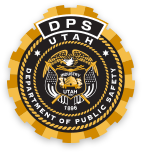A Change in Command
In the spring of 1964, Commissioner Jay C. Newman retired from law enforcement after serving 40 years with the FBI and the Utah Department of Public Safety. He died May 28, 1986.
In November 1964, Calvin L. Rampton was elected Governor of Utah. Governor Rampton appointed C. W. “Buck” Brady to the Commissioner’s post in February 1965. In March, Ray H. Evans was appointed Colonel. Commissioner Brady served for just over one year. Following his appointment, Brady was investigated by a Grand Jury for irregularities when he served as County Commissioner in Salt Lake County, some years before. Due to political pressure, he resigned from this appointment and was later indicted. At a later date he was found, “not guilty,” by a jury. However, the charges had completely ruined his reputation.
Following Brady’s resignation, Governor Rampton appointed Raymond A. Jackson as Commissioner, effective May 1, 1966. Commissioner Jackson had served with the Juab County Sheriff’s Office for 21 years, most of the time as Sheriff.
Ray Evans had worked as a Davis County Deputy Sheriff before joining the Patrol in 1941. He had worked his way up through the ranks, remaining in Farmington his entire career. Officers that worked with Ray described him as loyal and dependable. One of Colonel Evans’ first changes was the implementation of a helmet and baton for riot duty. All troopers received riot training in connection with this new equipment. Members of Division I, under the direction of Lieutenant Willis E. Wood, renovated a school bus furnished by Box Elder County, for duties associated with riot control. The mobile command post also served as a transportation vehicle for officers, and as a temporary holding facility for prisoners.
In 1966, weighmen and dispatchers were designated as troopers and received basic training in weapons, report writing, and accident investigation at Camp Williams. For many years, the Utah Highway Patrol and the Utah Peace Officers Association lobbied the legislature for a police academy. Years of work paid off in 1967. With the passage of Senate Bill 66, mandatory training for peace officers and the establishment of a training academy became a reality. The legislature appropriated $65,000 for police training.While this amount was not significant, the fact that basic training was now mandated by law was seen as a major victory for law enforcement. Another bill labeled the peace officer retirement act failed. The 1967 legislature reduces the presumptive level of driving under the influence of alcohol to .08 percent, the lowest in the nation.
In 1968, Utah was connected to the National Criminal Information Center (NCIC). The very first inquiry fed into the Utah terminal was a “hit.” Patrol cars of the UHP were also equipped with the first electronic sirens in 1968.
